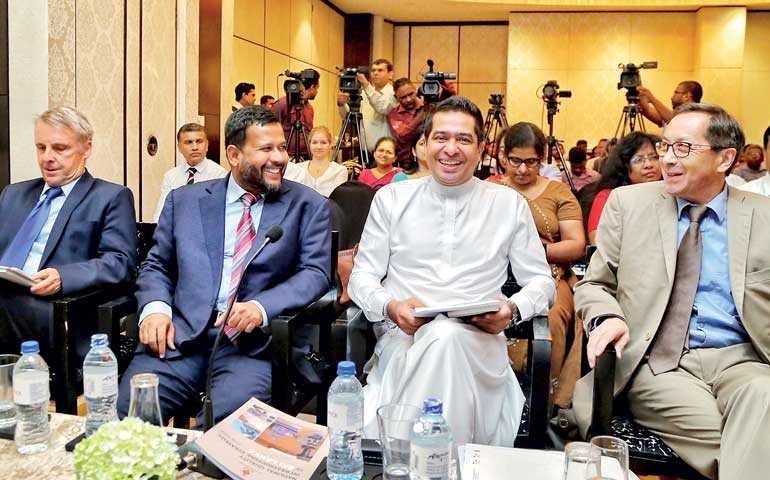Thursday Feb 19, 2026
Thursday Feb 19, 2026
Tuesday, 5 March 2019 00:10 - - {{hitsCtrl.values.hits}}

From left: German Ambassador Jörn Rohd, Minister of Industry Commerce, Resettlement of Protracted Displaced Persons and Cooperative Development Rishad Bathiudeen, Minister of Science, Technology and Research Sujeewa Senasinghe and Ambassador of Delegation of the European Union to Sri Lanka and Maldives Tung-Lai Margue at the joint launch of publications on quality infrastructure in Sri Lanka at Movenpick Hotel, Colombo on 28 February
In the pursuit of its ambitious new export target of $ 23 b by next year, Sri Lanka is enlisting unprecedented international backing to advance its export standards, specifically on quality.
The latest nationwide effort which would see the birth of a national quality infrastructure scheme led by a National Quality Council – the first-ever apex structure for quality – is now on the cards.
Backing this global trade effort are major catalysts in international trade – the European Union, Geneva’s International Trade Centre, UNIDO, the German Federal Ministry for Economic Cooperation and Development (BMZ) and Germany’s metrology institution, the PTB.
“As the Government focuses on a $ 23 billion export target by 2020, the need to enhance global market access through overcoming border rejections, delays in conformity assessment, higher testing costs for the private sector and risk management associated to border operations and e-commerce, is now experienced more and more. Therefore, there is no doubt that our quality infrastructure should be updated on par with global standards,” said Minister of Industry Commerce, Resettlement of Protracted Displaced Persons and Cooperative Development Rishad Bathiudeen on 28 February in Colombo, addressing the joint launch of publications on quality infrastructure in Sri Lanka at Movenpick Hotel.
Also present were Minister of Science, Technology and Research Sujeewa Senasinghe, Ambassador of Delegation of the European Union to Sri Lanka and Maldives Tung-Lai Margue, German Ambassador in Sri Lanka Jörn Rohd, National Quality Expert Sumathy Rajasingham, National Director of UNIDO Focal Point Nawaz Rajabdeen, Project Coordinator of Physikalisch-Technische Bundesanstalt (PTB)-Germany, Verena Stauber, technical expert Jairo V Diaz and many other local and international quality infrastructure experts.
The event saw the launch of publications such as results derived from the EU-Sri Lanka Trade Related Assistance Project funded by the European Union and implemented by UNIDO (with the International Trade Centre, Geneva) and Strengthening Quality Infrastructure in Sri Lanka Project funded by the German Federal Ministry for Economic Cooperation and Development (BMZ) and implemented by PTB.
UNIDO launched the NQI Strategy (NQI-S) document that paves the way to achieve international recognition for Sri Lanka’s NQI system through the implementation of a National Quality Policy, while Germany’s PTB showcased the Quality Infrastructure (QI) Catalogue, a directory for understanding the NQI and its services in Sri Lanka.
During her presentation, National Quality Expert Sumathy Rajasingham announced the framework for Sri Lanka’s first National Quality Council, which would, when set up, become the apex cross-functional agency on quality infrastructure. Minister Senasinghe stressed his Ministry’s role in innovations and development of quality standards.
“Today, we thank the EU, and Geneva’s International Trade Centre, UNIDO, the German Federal Ministry for Economic Cooperation and Development (BMZ) and Germany’s PTB for this invaluable support to Sri Lanka’s trade,” said Bathiudeen.
He added: “Global market access is not only important for our export revenues but also is vital for the success of Sri Lankan brands internationally. More and more trade forums across the world increasingly discuss about market access rather than free trade which they used to do earlier. As a result, we have to understand that market access is the new trade reality, and adjust our export strategies and resources accordingly. Thus, the challenges we face to enhance our global market access have to be resolved well for Sri Lanka to move forward in world trade. Today’s initiative is a vital step towards greater global market access for Sri Lankan exports as well as Sri Lankan brands in competitive international trade.”
Margue said that latest publications were part of enhancing international recognition of Lankan NQI institutions and added: “NQI Strategy was launched in July 2018 under the National Export Strategy of PM Ranil Wickremesinghe. I thank Minister Bathiudeen for his kind words and I confirm our good cooperation on NES, which is part of comprehensive Sri Lanka-EU trade related assistance project of Euro 8 million, on a request made by Lankan Government.” Rohd said as Sri Lanka’s tourism grows, quality infrastructure would play a bigger role. “The question of quality is very important as Sri Lanka aims at higher number of tourists. Quality becomes paramount as tourists get diverse. A small destination like Bali is getting six million tourists annually due to its high quality infrastructure.”
Among the challenges Sri Lanka is facing in enhancing global market access, as noted by Minister Bathiudeen, are shortages in harmonised local certifications and conformity assessment, a standardised sets of practices to ensure compliance with international standards, transparent inspection and certification systems, and simplified trade to fulfil Trade Facilitation Agreement (TFA) requirements that relate to SPS and TBT.
The other stages in the project unveiled on 28 February – such as the national base-line and end-line surveys planned with the support of Germany’s PTB – will ensure that Sri Lankan producers and exporters become well versed in global best practices to boost their market access rates. Sri Lanka recently revised its export target (by 2020) to $ 23 b from an earlier target of $ 20 b.